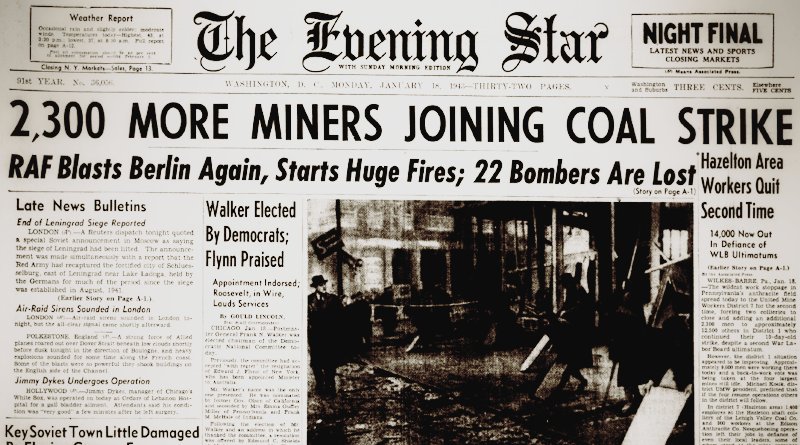World War II Chronicle: January 18, 1943
Click here for TODAY’S NEWSPAPER
Eddie Rickenbacker’s copilot continues his story on page five… Lt. Col. Eliot Roosevelt is pictured lugging his reconnaissance camera on page six… Seven features a first-hand account from a war correspondent that rode along during the Royal Air Force’s bombing raid on Berlin… George Fielding Eliot column on page eight… Sports page begins on page 13
Roving Reporter by Ernie Pyle
WITH THE AMERICAN FORCES IN ALGERIA — There were a lot of things the Charlotte doctors and nurses hadn’t visualized before they set up their big tent hospital here in the field. The natives, for instance. Arabs in their long gowns come wandering across the plains hoping miraculous Americans can cure their ailments.
So the hospital has had to set up a separate tent for them. They have local people in there wounded by shrapnel in the first battle. They have one 81-year-old woman whose arm was blown off. They have several they’ve done normal operations on.
They had one Arab woman shot through the stomach. Her condition was grave. But on the second morning her husband arrived, said he had to go to work and there wasn’t anybody to take care of the kids, and for her to get the hell home where she belonged. So she got up and walked out. The doctors don’t think she could have lived through the day. But you know how it is with us Arabs — we don’t like our women gadding about when there’s work at home.
While I was there a ragged Arab with a long stick came in with his 10-year-old boy. The child had a hideous rash over his neck and face. Through the interpreter, the Arab said he had been praying and praying for the Americans to come so they could do something for his boy. His belief in us was touching, but the doctors fear the scourage is beyond their ken.
The Army’s Arabic interpreters, incidentally, are completely accidental. They weren’t assigned to the hospital unit by design or anything. It just happened.
One is Pvt. Israel Tabi, New York city. He was born in Arabia Yemen, and came to America when he was 20. He’s 35 now, and a house painter by profession. So far as he knows his parents are still in Arabia, and who can tell, he might see them one day.
He says the Arabic spoken here is quite similar to what he knew. I mentioned that he was performing a very valuable service here. Private Tabi is volubly patriotic. He said “I will do anything for my country. Whatever they ask me to do, I will do. I will work day and night. I love my country. I will do anything for it.”
The other interpreter is an Egyptian — Pvt. Abraham Casper Leon Saide (pronounced Sadie). He lives in Buffalo, N.Y. He is a watch repairer by trade. He was born in Alexandria, Egypt, is now 34, and Came to America in 1924. He speaks Turkish, Greek, Egyptian all those exotic languages. It looks as though Private Saide might have a very useful career ahead of him in the Army.
The hospital already has handled more than 1,000 patients and hasn’t lost a one. The doctors run to the nearest stake and knock on wood when they say it. The surgeons have performed 125 operations.
There’s no red tape about whether a patient is legally entitled to enter the hospital or not. They take anybody who comes — soldier, civilian, Arab, Frenchmen, anybody.
The way they ignore formalities when emergency arises is one of the things that have made me feel so warmly toward this battlefront hospital. The other day we were looking at those round-bellied iron stoves half-buried in the ground in each tent.
“What do you burn in them?” I asked Lieutenant Colonel Bauchspies, the commander.
“Wood,” he said.
“Where do you get the wood?” I asked.
“Steal it,” he said.
When you’re saving lives you don’t requisition and wait; you forage and borrow and even steal if necessary. And nobody stands on rank. Recently Major General Fredendall made an inspection tour through the hospital. Colonel Bauchspies croaked hoarsely like a frog.
“How did you lose your voice?” asked the colonel.
“I lost it driving tent pegs,” said the colonel.
“Your guard looks nice,” said the general. “Where did they get those new rifles?”
“I daren’t tell you sir,” said the colonel. The general smiled. And nodded.
Evening star. (Washington, D.C.), 18 January 1943. Chronicling America: Historic American Newspapers. Lib. of Congress.
https://chroniclingamerica.loc.gov/lccn/sn83045462/1943-01-18/ed-1/
